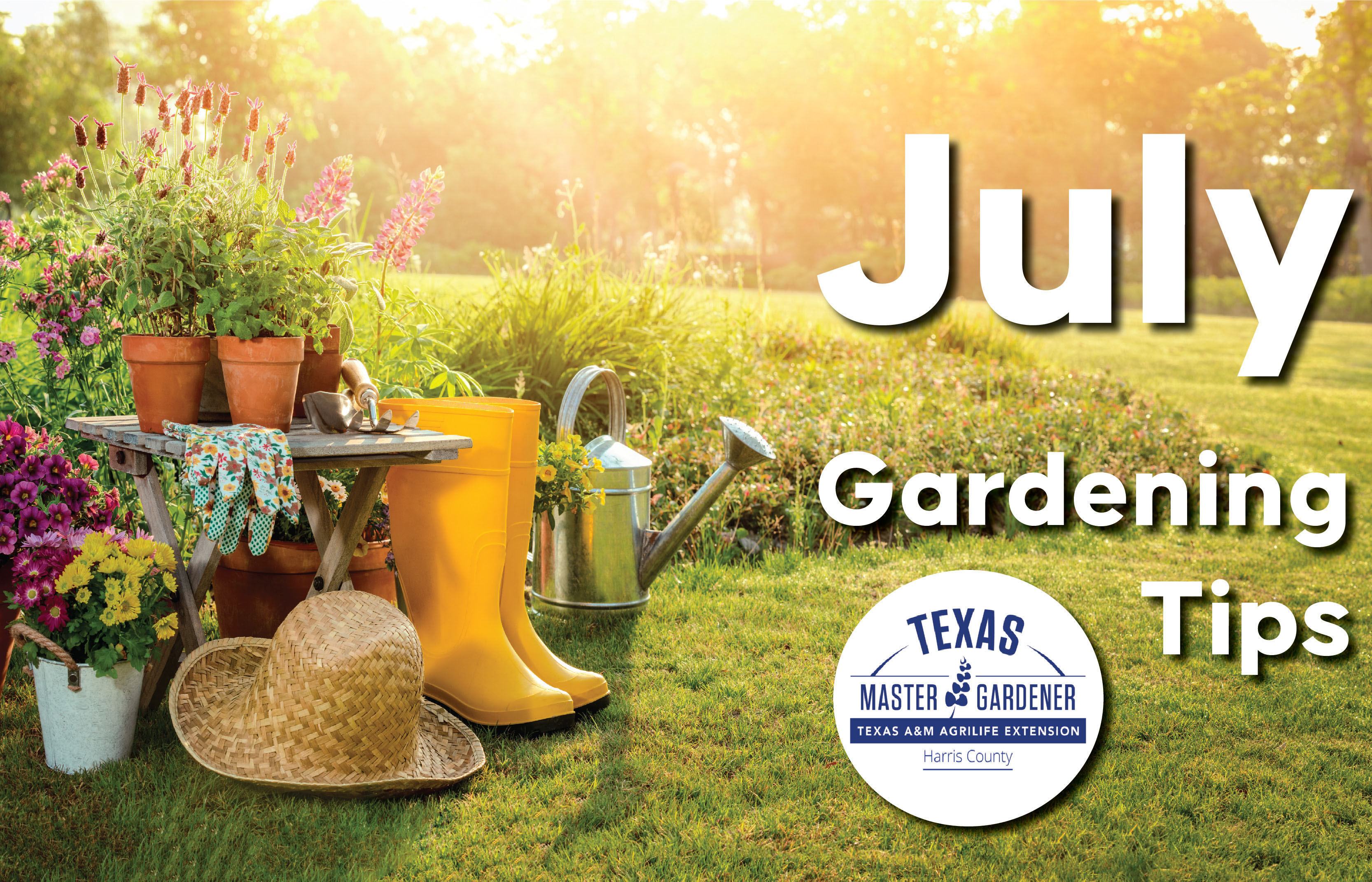
July Gardening Tips for Houston-Area Homeowners: Expert Advice from Harris County Master Gardeners
As the “dog days of summer” settle into Harris County, local gardeners in Harvest Bend Section 1 are experiencing typical July conditions, with warm temperatures and regular rainfall patterns. While it may not be hotter or drier than usual just yet, summer still brings intense sun, high humidity, and the risk of pests—all of which can stress even the hardiest plants. That’s why the Harris County Master Gardeners are offering timely, practical advice to help residents stay ahead of the heat and keep their gardens thriving all season long.
Karen Shook, a longtime Master Gardener and horticultural educator, understands the challenges of summer gardening in the Houston area. “To be honest, my personal garden calendar in July says do what is required for maintenance—weed, water, mulch, deadhead, harvest—early in the day, then get back to the air conditioning,” she said. “That’s just being realistic about summer in Houston.”
Best Plants and Flowers for Houston Gardens in July
While outdoor work may be limited by the heat, many ornamental grasses begin to bloom in July, offering texture and visual interest. Drought-tolerant perennials such as salvia can add color to the landscape, and planting them is still possible if gardeners take care to keep the root ball and surrounding soil consistently moist.
“Planting in July is possible if you take care to keep the root ball and surrounding soil moist,” said Shook. A light dose of fertilizer can give perennials a boost, though slower growth is a normal response to the heat.
For annuals such as amaranthus, cosmos, and marigolds, direct seeding is still an option. Deadheading spent blooms and shearing back plants that are losing vigor, followed by fertilizing and watering, can revive summer color. Actively blooming annuals also benefit from regular fertilization.
Summer Rose Care, Shrub Maintenance & Lawn Advice
Roses can still be enjoyed in July, even if the blooms are smaller. Continue cutting stems back to the first leaf with five leaflets to promote new flowers. Keep up with pest and fungus control every 7–10 days and feed roses every 4–8 weeks to maintain their health.
For shrubs, it’s especially important to monitor shallow-rooted varieties like azaleas, which are sensitive to drought and are currently setting buds for spring. If you haven’t fertilized young shrubs or trees in the last six to eight weeks, now is the time.
Mobile Sidebar Ad
Harris County lawns can also face unique challenges in July. “It is chinch bug season,” Shook warned. “If you see irregular patches of dead or stunted grass, check for chinch bugs.” Homeowners are encouraged to prune lower tree limbs to improve sunlight for turfgrass and consider replacing difficult lawn areas with ground covers more suited to the location’s light conditions.
Ground covers that look leggy or sparse can be sheared back and fertilized—especially in young plantings or areas that have yet to fill in fully.
Preparing Your Houston Vegetable Garden for Fall
Although July is a quiet period for many vegetable gardens in Texas, it’s the perfect time to start prepping soil for the upcoming fall planting season. Applying mulch keeps the soil cool and supports healthy root systems. Early July is also a great time to take tomato cuttings and root them for fall transplants. Check out this comprehensive vegetable garden planting dates chart curated by the Harris County Master Gardeners for an overview of key dates for planning.
Fruit trees less than a year old can be fertilized moderately. Soil moisture should be monitored regularly, and Shook offers a clever test: “Use a long-handled flathead screwdriver—it pushes easily into wet soil but meets resistance in dry areas.”
Gardeners can use this method to ensure they’re watering deeply enough—ideally six inches for lawns and 12 inches for established trees.
Who Are the Harris County Master Gardeners?
The Harris County Master Gardeners are a team of trained volunteers working under the Texas A&M AgriLife Extension Service. Their mission is to provide free, research-based horticultural education to the public throughout the Greater Houston area. From maintaining demonstration gardens to answering resident questions and offering workshops, these volunteers are a trusted source for home and community gardeners alike.
They also publish monthly gardening calendars, host plant sales, and offer expert guidance on everything from composting to integrated pest management, all tailored to the unique climate of the Texas Gulf Coast.
Mobile Sidebar Ad
How to Get Gardening Help or Become a Harris County Master Gardener
Residents looking for personalized gardening help can submit questions directly through the Harris County Master Gardener Help Desk. Whether it’s diagnosing lawn issues, recommending the best plants for Houston summers, or creating a pollinator-friendly landscape, trained volunteers are available year-round to assist.
Those who want to deepen their knowledge or give back to the community can apply to become a certified Master Gardener. The program includes horticultural training and hands-on experience, with opportunities to serve through community projects, public events, and educational outreach.
Becoming a Master Gardener is not only a way to grow your skills—it’s a chance to be part of a community that helps all of Harris County bloom.
Stay tuned with My Neighborhood News for more seasonal gardening tips, local plant recommendations, and Harris County home care updates.
 Tiffany Krenek has been on the My Neighborhood News team since August 2021. She is passionate about curating and sharing content that enriches the lives of our readers in a personal, meaningful way. A loving mother and wife, Tiffany and her family live in the West Houston/Cypress region.
Tiffany Krenek has been on the My Neighborhood News team since August 2021. She is passionate about curating and sharing content that enriches the lives of our readers in a personal, meaningful way. A loving mother and wife, Tiffany and her family live in the West Houston/Cypress region.





